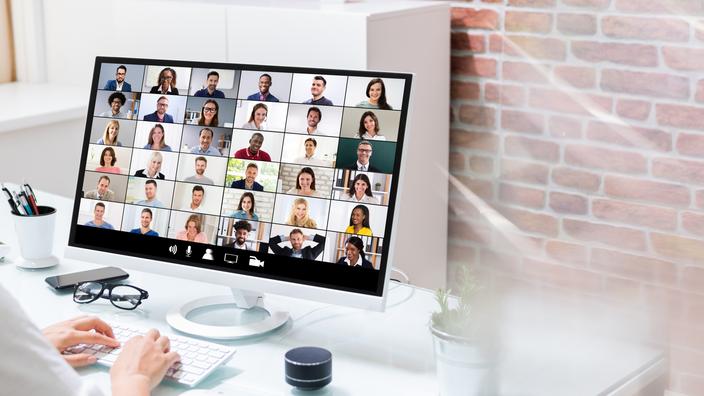For the past two years, we've gotten used to juggling virtual meetings (Zoom, Teams, etc.) and face-to-face meetings.
Between the two, a difference is quickly obvious: the former usually start on time while the latter often start late.
To discover
SIMULATOR - Are you getting paid well?
Everything you need to know about skills assessments
Face-to-face meetings require travel.
Remotely, barring a technical incident, you can connect with a click or two: this simplicity rhymes with speed;
you enter a meeting instantly, without having to run, getting lost in the corridors before finding the right room and then struggling (sometimes) to get a seat.
Shorter meetings
"In person, to justify being late, you can always take shelter behind the crowded elevator, the queue at the coffee machine or the room difficult to find," said
Julien Fanon, executive director at Accenture.
Nothing like it from a distance.
"After 18 months of teleworking, there is no longer any question of evoking a connection problem"
, adds Julien Fanon.
Digital tools are efficient and beware of those who take refuge behind technical difficulties to justify their delay.
It works once, not twice.
Shorter meetings
At a distance, half-hour slots have become the norm because in front of a screen the attention is more intense.
It is therefore more tiring.
This 30-minute format has replaced the traditional physical meetings of an hour or more.
This short format requires starting on time.
“
If a 30-minute meeting begins ten minutes late, it is mechanically reduced by a third,
continues Julien Fanon at Accenture.
Suffice to say that it loses its raison d'être.
In teleworking, we tend to lose track of time;
“downtime” is being erased, breaks are becoming rarer, explains Juliette Massart, work psychologist and consultant at Onepoint, a digital transformation consulting company.
These shorter meetings are necessary because “
we are more focused on our tasks, with tools that calibrate our day”
.
We go straight to the point
For face-to-face meetings, the agenda set in advance outlines all the topics that will be discussed.
It is sometimes preceded by a tour de table, when presentations are necessary or when everyone has to explain the files on which they are working.
In distancing, the strict agenda remains an exception.
The deadlines collected mean that we get straight to the point.
Stakeholders, rather than adding files or carrying out a general analysis, focus on one point in particular.
This concern for efficiency is an additional factor of punctuality: by arriving late, there is a risk of missing key explanations.
Manage to decide
In theory, the shorter virtual meetings and their faster pace than the face-to-face could suggest that decisions are made faster.
Not necessarily.
"Less disruption in the course of remote meetings also means less off, informal and contextual information
," says Julien Fanon at Accenture.
These different decision support elements are those that can be learned between two doors by going to a meeting.
Or maybe around a table as an aside.
By eliminating these moments of transition, we deprive our brain of cuts that are nevertheless beneficial to memory or concentration.
Julie Massart recommends scheduling virtual meetings with at least five minutes of beat.
Unnecessary trips
Since the start of the health crisis, digital tools have replaced certain trips deemed superfluous.
The Parfums de Marly brand, distributed in more than 80 countries, illustrates this well.
Its CEO Julien Sausset has returned to the perception of time zones.
“
It is essential when it comes time to make an appointment with our subsidiaries or our distributors
,” explains Julien Sausset.
You miss an hour and it is potentially one or more days lost before being able to reset a call with all the interlocutors.
"
Punctuality is more than required.














